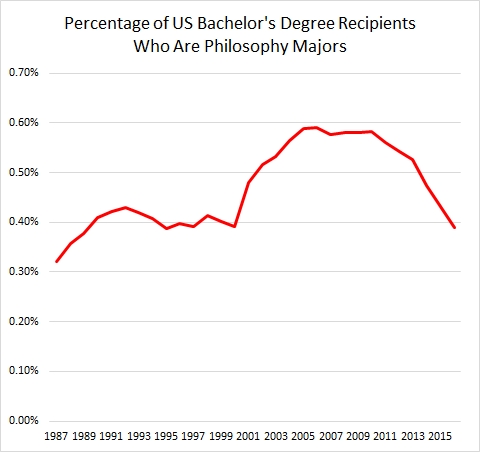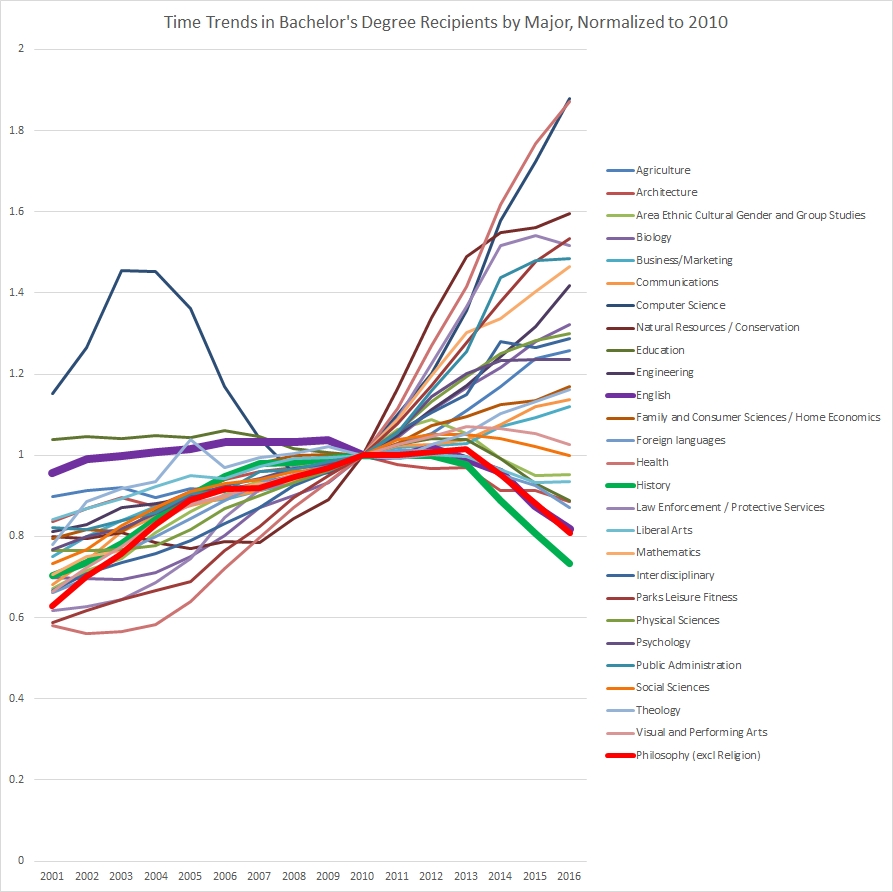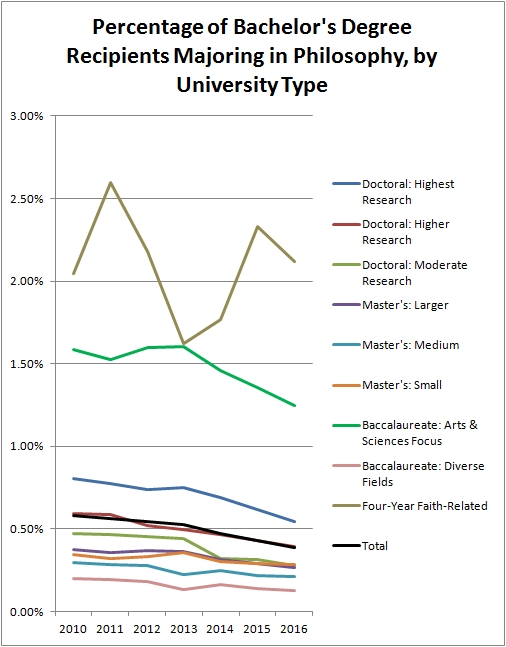Sharp Declines in Philosophy, History, & Language Majors Since 2010 (guest post by Eric Schwitzgebel)
The following is a guest post* by Eric Schwitzgebel, professor of philosophy at University of California, Riverside. It first appeared at his blog, The Splintered Mind.
Sharp Declines in Philosophy, History, and Language Majors Since 2010
by Eric Schwitzgebel
As I was gathering data for last week’s post on the remarkably flat gender ratios in philosophy over time, I was struck by a pattern in the data that I hadn’t anticipated: a sharp decline in Philosophy Bachelor’s degrees awarded in the U.S. since 2010.
In the 2009-2010 academic year, 9297 students received Bachelor’s degrees in Philosophy in the U.S. In 2015-2016 (the most recent available year), the number was only 7507. In the same period, the total number of Bachelor’s degrees increased from 1,597,740 (completing 1,684,011 majors, including double majors) to 1,922,705 (2,019,829 including doubles). In 2009-2010, 0.58% of graduating students majored in Philosophy. In 2015-2016, 0.39% did. [See Note 1 for methodological details.]
Looking more closely at the year-by-year data, the decline in absolute numbers is entirely in the most recent three years, and quite precipitous:
2010: 9297 philosophy BAs (0.58% of all graduates)
2011: 9309 (0.56%)
2012: 9376 (0.54%)
2013: 9439 (0.53%)
2014: 8837 (0.47%)
2015: 8198 (0.43%)
2016: 7507 (0.39%)
As a fan of the Philosophy major, I am alarmed!
A broader look at the data is partly reassuring, however: There was a similarly precipitous increase in the numbers and percentages of philosophy majors in the early 2000s, as displayed in the graph below. So maybe we’re just seeing the pop of a philosophy bubble?
For further context, I examined every other broad category of major with at least 100,000 graduating majors since the 2000-2001 academic year (27 broad majors total). Since 2010, only two other broad majors have declined in absolute number by at least 15%: History and English. Foreign language isn’t far behind, with a 13% decline in absolute numbers. So Philosophy’s decline seems to be part of a general decline in the main traditional humanities majors. (The three biggest gainers: Computer Science, Health Science, and Natural Resources.)
I’ve graphed the data below. (I’ve thickened and brightened English, History, and Philosophy. Note also that the English line is mostly obscured by the Philosophy line in recent years.)
I’ve put the raw numbers for all major categories in CSV here, if you’d like more detail.
Finally, I looked at recent trends by institution type (Carnegie 2015 basic classification). As you can see from the chart below, the decline appears to occur across most or all institution types. (The top line, for four-year faith-related institutions, is jagged presumably due to noise, given low total numbers.)
I’m not sure what to make of this. I suppose Wittgenstein, who reportedly advised aspiring students to major in anything but philosophy, would have approved. Thoughts (and corrections) welcome!
*******
Note 1: Data from the NCES IPEDS database. I looked at all U.S. institutions in the IPEDS database, and I included both first and second majors. Before the 2000-2001 academic year, only first major is recorded. I used the major classification 38.01 specifically for Philosophy, excluding 38.00, 38.02, and 38.99. Only people who completed the degree are included in the data. Some majors have different classification titles and criteria over the period, so I needed to make a few coding/grouping decisions. The most important of these was disaggregating the History subfield from the “Social Sciences and History” category in the 2000-2001 and 2001-2002 data. Although there are some category and coding differences over time in the dataset, the 2011-2012 to 2015-2016 academic years appear to have used exactly the same coding criteria.





Probably a large part of the explanation is the near collapse of the law job market over the past decade. Philosophy is one of the best pre-law majors.
Several people have suggested that it relates to the Great Recession of 2008. I don’t think that can be the entire explanation, since the recessions of the early 1990s and early 2000s don’t correlate with sharp declines in the major. On Facebook, Todd Yampol offers this interesting analysis:
In many states, business interests have put pressure on the state government to prepare students for the “jobs of the future”. They complain that high school & college graduates don’t have the specific skills that they’re looking for. Also, there has been more and more emphasis on undergrads to finish in 4 years (for a 4-year degree). In California and many other states, there is a state-sponsored “finish in 4” initiative. They provide funding to the state universities for software & other projects that will help students finish in 4 years. They only way to do this, given all the crazy requirements these days, is to determine your major very early & stick with it. This is definitely the case at CSU. Not sure about UC. I believe this initiative started in CA around 2012. I’ve been working with CSU since 2014. I’m not saying that this is inherently a bad thing. It’s just the environment we’re living in. I come from a liberal arts background, and I see the value in being a well-rounded person.
I think it comes down to the question “what is the purpose of a state university?” In some states like Wisconsin (where I grew up), there has been a lot of pressure from the (ultra-conservative) state government to dismantle the traditional approach to higher education & research, and turn the emphasis towards job training.
Anyway, the pressure for job skills & to finish in 4 years makes it difficult for young people to explore and find their true interests. How many freshman / sophomores know that they’re interested enough in philosophy / linguistics / history / etc to declare it that early? I didn’t declare linguistics until my very last semester (long story).
When did the aggressive move to get kids into STEM at a young age begin? I get the sense that we may be experiencing the downstream effects of policies along these lines that were implemented in early ed. at some point in the fairly recent past.
I read more and more essays from undergraduates with statements like “Plato’s claim is false because he has no quantitative evidence.”
The 1960s, during the space race.
Thanks for this, Eric! Oddly, the raw numbers of PhD graduates have a similar pattern, roughly going up until around 2013 (see the SED data on the last graph here: http://placementdata.com/data/ ; note that the dip after 2013 is also in the APDA data, but that our data is incomplete prior to 2011). I would not have expected that, given the time lag between degrees.
I think the Great Recession can do most of the work explaining this, but only if we take into account some of its wider effects. For one thing, it’s misleading to compare the Great Recession and the early 90s and 00s recessions. Both of those recessions were relatively mild even by the standards of post-WWII recessions. Within a year or two at most the labor market had recovered from those recessions, while it took until 2014 for economy to regain the jobs it lost in the Great Recession. It’s not surprising that the job market being so bad for so long would really push people toward majors they see as marketable and away from “impractical” degrees. Another factor here is that the great recession lead most states to make huge cuts to higher education spending which drove huge increases in tuition costs particularly at public colleges. It took a while for this to play out, so that would make sense of the fact that the decrease in majors really took off around 2011. Tuition costs didn’t go up too much when the recession first hit, but they spiked in the 09-10 year and went up substantially every year for three years afterward. In fact, they went up about 27% in the years immediately following the Great Recession. When tuition goes up like that students are again under a lot of pressure to study something that they think is marketable. Anyway, if we want students to feel comfortable studying fields like philosophy then we really need to think a lot about the cost of college. When they’re paying something on the order of $25,000 a year when it’s all said and done for a degree I can’t blame them for thinking of college primarily in terms of job training. Heck if I’d had to go 40,000-50,000 in debt to get my degree I don’t know if I would have studied philosophy.
Also, as much as I loathe him, I don’t know that we can blame Walker and his ilk for the tuition increases. Democrats haven’t done a whole lot better on this score in most places. In Virginia Tim Kaine presided over a lot of higher education cuts, and our current Democratic governor Terry McAuliffe just cut higher education spending last year. Granted he’d modestly increased it before that, but it’s still below what it was before the great recession, which is true in pretty much every state whether they’ve a Democratic or Republican government.
A correction: Walker and the Republican legislature cut funding for UW AND froze tuition AND stopped raises (in fact slashed take-home pay with Act 10; don’t even get me started on weakening tenure). The result is that while Madison is doing all right, the other campuses in UW (there are 26 in the System not counting the new online campus) are struggling–and unless things change politically here–some face closing. None of this is accidental.